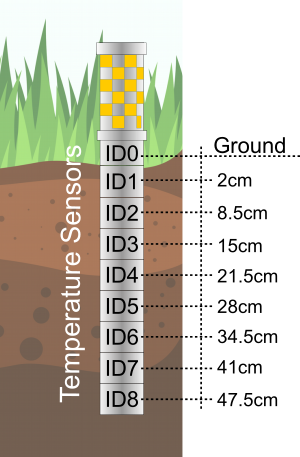
The opportunities for Wireless Sensor Networks are as well various and challenging. In agriculture, e.g., distributed sensors can be used to measure plant growth or for soil analysis. Here, robustness of single nodes and the whole network is of major importance for successful projects or smart farming approaches. Almost every environmental impact has also direct or indirect influence on the lifetime of the nodes or the network, whereby also huge deviations in environmental conditions occur. Provoked by sun exposure, a single sensor node can show a difference in temperature of 56°C in just one day. Additionally, there is an intense heterogeneity in temperature between the particular nodes within the network.
To enable a long-term operation of sensor networks under such conditions they should be very robust against such influences and energy supply has to be ensured. Besides other things, robustness can be achieved by reducing the energy requirements of the node, respectively by adapting the requirements to the generation or vice versa. Additionally, some tasks (e.g., record, store, or process data) can be postponed or relocated in order to adapt them in the temporal or the spatial dimension, on a single node and/or within the network, and to adjust them to the specific environmental or energy conditions. So, especially in outdoor scenarios we have the situation that a.) Some nodes may work more energy efficient than others - due to their temperature and their individual characteristics (heterogeneity within the network) and b.) Changing environmental conditions (over time - e.g. direct sunlight / shadow or day / night) lead to dynamic shift of the energy efficiency of single nodes or the whole network. Opportunities for Energy Harvesting share this dynamics, as well.
Monitoring the changing environmental conditions allows to benefit from the systems dynamics. Realistic models for energy and reliability will be derived from these measurements. Combined with the knowledge about the characteristics of the nodes in the network, this information can, e.g., be used for routing decisions, task scheduling, and processing within the network. By predicting the environmental variables, a suitable time for performing intensive computations or forwarding data in delay tolerant networks can be determined. Specific scheduling and routing protocols will be developed to achieve a robust wireless sensor network under dynamic conditions. The investigated relations and the implemented algorithms will be evaluated continuously in a real environment.

This experiment was used to measure the soil temperature in different depths. Using this

The reaper is a test platform for energy harvesting. Its purpose is to provide a generic interface for energy sources and energy storages. Commonly used are super capacitors as storage and solar panels or peltier elements for harvesting.
Additionally, the platform integrates a programmable voltage supply, a secure co-processor and a generic header for the base board holding the actual MCU.
The platform allows to test different MCUs in an energy harvesting sensor node.
| Name | Phone | Room | |
|---|---|---|---|
| Robert Hartung | |||
| Prof. Dr. Ulf Kulau | kulau[[at]]ibr.cs.tu-bs.de | ||
| Prof. Dr. Felix Büsching | f.buesching[[at]]ostfalia.de | +49-531-3913289 | 111 |
| Prof. Dr.-Ing. Lars Wolf | wolf[[at]]ibr.cs.tu-bs.de | +49-531-3913288 | 138 |
| Title | Type | Supervisor | Status |
|---|---|---|---|
| Porting IdealVolting to the RIOT Operating System with respect to utilizing low power management | Project Thesis | Robert Hartung, Prof. Dr. Ulf Kulau | finished |
| Development of a battery test card to measure temperature effects on batteries | Master Thesis | Robert Hartung | finished ~2017 |
| Optimierung, Parallelisierung und Erweiterung des COOJA-Simulators | Team Project Thesis | Robert Hartung | finished ~2017 |
| Battery modelling with respect to temperature | Bachelor Thesis | Robert Hartung | finished ~2019 |
| Online modeling on wireless sensor nodes under energy and memory considerations, ... | Master Thesis | Robert Hartung | finished ~2018 |
| Entwicklung eines kontextabhängigen Ratings für Sensorknoten in drahtlosen Sensornetzwerken | Master Thesis | Robert Hartung | finished ~2018 |
| Entwicklung eines Micro-Source-Energy-Harvesters für Sensorknoten | Master Thesis | Prof. Dr. Ulf Kulau | finished ~2016 |
| Evaluation von transienten Knotenausfällen im FIT/IoT-Lab | Bachelor Thesis, Project Thesis | Prof. Dr. Ulf Kulau | finished |
| Datenerhebung von IEEE 802.15.4 Radios unter verschiedenen Temperatureinflüssen | Bachelor Thesis | Prof. Dr. Ulf Kulau, Robert Hartung | finished ~2016 |
| An adaptive prediction approach for low power WSN | Master Thesis | Prof. Dr. Ulf Kulau | finished ~2017 |
| Abhärtung des RPL-Protokolls gegen transiente Knotenausfälle | Master Thesis | Prof. Dr. Ulf Kulau | finished ~2016 |
| Energy Harvesting für Sensorknoten unter Nutzung der Bodentemperatur | Bachelor Thesis | Prof. Dr. Ulf Kulau | finished |
| RPL Objective Function to optimize the lifetime of Wireless Sensor Networks | Master Thesis | Robert Hartung | cancelled |
If you are interested in writing a thesis regarding this project, please feel free to contact Robert Hartung.
 This research project is funded by the German Research Foundation (DFG) under grants no. BU 3282/2-1.
This research project is funded by the German Research Foundation (DFG) under grants no. BU 3282/2-1.
Vacancies of TU Braunschweig
Career Service' Job Exchange
Merchandising
Term Dates
Courses
Degree Programmes
Information for Freshman
TUCard
Technische Universität Braunschweig
Universitätsplatz 2
38106 Braunschweig
P. O. Box: 38092 Braunschweig
GERMANY
Phone: +49 (0) 531 391-0